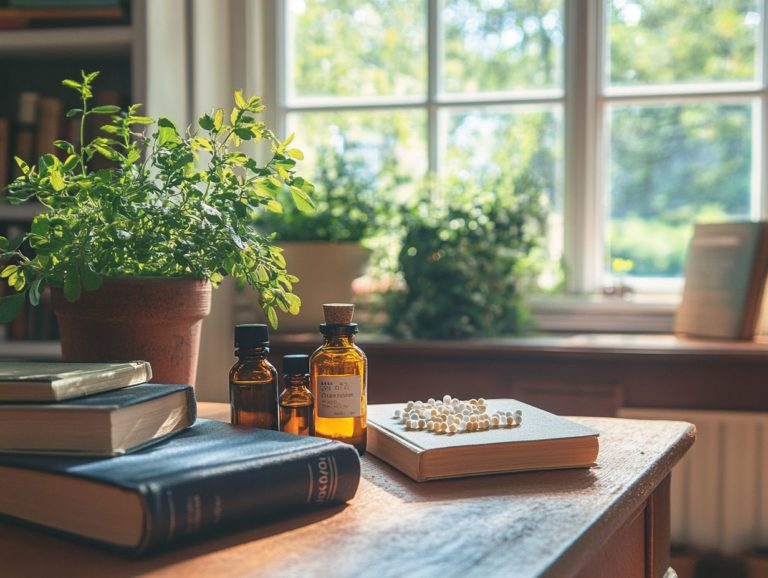Is Alternative Medicine Safe for Everyone?
Alternative medicine offers a captivating range of treatments and philosophies that resonate with those in search of holistic health solutions.
Given the variety of types and approaches, it’s crucial to grasp the nuances of safety and effectiveness. This article delves into multiple facets of alternative medicine, discussing potential risks, identifying who can safely engage with these practices, and outlining necessary precautions for vulnerable groups such as pregnant women, children, and the elderly.
It also examines the interplay between alternative and conventional medicine, equipping you with the knowledge needed to make informed choices regarding your health.
Contents
Key Takeaways:

Alternative medicine offers many options, but it s vital to be aware of safety concerns. Identify safe candidates to ensure your well-being. To ensure safety when using alternative medicine, follow tips for safe usage and be aware of possible interactions between alternative and conventional medicine.
Understanding Alternative Medicine
Alternative medicine includes a diverse array of practices and therapies that exist beyond conventional medical treatments. These often aim to tackle health issues through complementary methods.
These approaches, including integrative medicine, strive to address not only the physical ailments of cancer patients but also their emotional and psychological well-being. This acknowledges the profound connection between body and mind.
By incorporating alternative therapies such as:
- Acupuncture
- Herbal medicine
- Yoga therapy
You may discover holistic pathways to recovery and an enhancement in your overall health.
Types and Approaches
The landscape of alternative medicine is vibrant, woven with diverse types and approaches that offer unique benefits tailored to your individual health needs. From energy healing techniques to comprehensive systems like Ayurvedic medicine a traditional healing system from India practitioners harness complementary therapies to elevate patient care.
Modalities such as acupuncture, herbal medicine, and yoga therapy are pivotal in promoting wellness and managing conditions, especially for those like cancer patients seeking alternative treatments.
Understanding the nuances of these therapies enables you to make informed choices on your health journey. Take acupuncture, for example; it utilizes fine needles at specific points to stimulate energy flow, relieving pain and enhancing overall balance.
Meanwhile, yoga therapy merges physical postures, breath control, and meditation to cultivate a holistic sense of well-being. It effectively addresses both physical ailments and emotional stress.
Herbal medicine, rooted in centuries of tradition, employs plant-based remedies to support various bodily functions. Choosing the right approach is essential, as different methods may resonate more effectively with specific conditions. This underscores the importance of personalized care and expert guidance within alternative medicine.
Safety Concerns with Alternative Medicine
Safety concerns regarding alternative medicine are essential considerations for you as a patient and for healthcare providers. This is especially true when these therapies intersect with conventional treatments for serious conditions like cancer.
While many alternative therapies can provide significant benefits, it s critical to evaluate potential risks and side effects. Ensure that you are fully informed before integrating such practices into your treatment plan.
This level of scrutiny is particularly vital for cancer patients, who may be more susceptible to adverse effects from unproven therapies. Act now to understand the risks and make informed decisions.
Possible Risks and Side Effects
Using alternative medicine means being aware of potential risks and side effects. While many people find benefits, some treatments, especially those paired with traditional cancer therapies, may have unintended consequences.
Discuss these risks with your healthcare provider. This ensures a balanced approach to your treatment strategy.
Certain herbal supplements can interact negatively with chemotherapy drugs, reducing their effectiveness or increasing toxicity. Therapies like acupuncture can help with pain, but they also carry risks, such as infections if not done in a sterile setting.
Consulting knowledgeable professionals helps you navigate these risks. This way, you can align your choices with your health goals.
Finding certified practitioners and keeping up with the latest research is important. This proactive approach allows you to use alternative therapies while minimizing risks.
Who Can Safely Use Alternative Medicine?

Identifying who can use alternative medicine requires careful evaluation of health conditions and personal preferences. For some patients seeking support alongside traditional cancer treatments, these therapies can offer significant benefits.
It’s crucial to consult with healthcare providers familiar with both alternative and conventional therapies. This ensures a safe approach tailored to your unique needs.
Identifying Safe Candidates
Identifying safe candidates for alternative medicine means understanding your individual health needs. This includes evaluating treatment compatibility and specific therapy benefits.
Your healthcare provider plays a key role in this process. They assess your physical and emotional needs, recommending additional therapies that enhance your treatment experience.
The evaluation starts with assessing your existing medical conditions and treatments. Certain health issues, like heart disease or diabetes, can affect the suitability of alternative therapies.
If you’re undergoing chemotherapy, therapies like acupuncture or meditation may help manage side effects and improve your well-being. Healthcare professionals also consider your mental resilience, as it impacts treatment effectiveness.
This holistic evaluation creates a supportive space for you to explore options that fit your health goals.
Precautions for Specific Populations
When exploring alternative medicine, take special precautions if you’re part of a specific population, such as pregnant women, children, or the elderly. Their health situations can affect the safety of various therapies.
For cancer patients, integrating additional therapies requires extra caution to avoid negative interactions with conventional treatments. Healthcare providers must be aware of these nuances to recommend safe practices for vulnerable individuals.
Pregnant Women, Children, and Elderly
Pregnant women, children, and the elderly require careful attention when exploring alternative medicine. Their unique physiological and psychological needs can greatly influence the suitability of various therapies.
It’s essential to assess the specific conditions of each group. What benefits adults may not be suitable for children or the elderly due to differences in metabolism and sensitivity.
For example, acupuncture, which is the practice of inserting thin needles into the skin to relieve pain, can help pregnant women with discomfort. However, it must be administered by a qualified specialist experienced in prenatal care.
Children may benefit from gentle practices like mindfulness and breathing exercises, which can aid in emotional regulation without overwhelming them.
The elderly, who often face chronic ailments, should consider therapies such as tai chi or yoga. These practices encourage gentle movement, enhancing flexibility and balance.
Carefully considering these unique needs is vital to ensuring the safety and effectiveness of alternative treatments.
How to Ensure Safety When Using Alternative Medicine
Ensuring your safety while exploring alternative medicine requires a proactive approach focused on knowledge-based decision-making and collaboration with your healthcare providers.
Actively seek guidance from qualified professionals to evaluate the suitability of different therapies and understand potential interactions with conventional treatments.
By following best practices and integrating established safety measures, you can engage with alternative medicine confidently and effectively.
Tips for Safe Usage

Adopting safe usage practices for alternative medicine is crucial for maximizing benefits while minimizing risks associated with various therapies.
Remember, not all alternative treatments are suitable for everyone, and some may interact negatively with conventional medications.
Before diving into therapies like herbal supplements, acupuncture, or homeopathy, consult a qualified healthcare provider who can assess your specific health needs.
Conduct thorough research on the credentials of practitioners and the reliability of treatment methods to avoid potential pitfalls.
Maintaining an open dialogue about your progress and any side effects enables timely adjustments, fostering a personalized approach to your care.
Alternative Medicine and Conventional Medicine
The relationship between alternative medicine and conventional medicine is complex and deserves careful attention, especially when treating serious conditions like cancer.
Understanding the potential interactions, benefits, and drawbacks of merging these two approaches is crucial for your health journey!
For many individuals facing cancer, combining the best of both worlds can significantly enhance overall well-being. However, it’s essential to navigate this landscape thoughtfully to avoid unintended consequences.
Possible Interactions and Considerations
Considering potential interactions between alternative medicine and conventional treatments is vital, especially in cancer care. Some alternative therapies may interfere with standard treatments, while others could enhance their effects.
Engage in informed discussions with your healthcare providers. Evaluating these interactions can help you develop safer, more effective treatment strategies tailored to your individual needs.
For instance, certain herbal remedies, like St. John’s Wort, may impact the metabolism of chemotherapy drugs, potentially diminishing their effectiveness. On the other hand, mindfulness practices and acupuncture have shown promise in alleviating pain and anxiety, positively contributing to your overall well-being during conventional therapies.
It’s crucial to consider your complete health picture, including any supplements or lifestyle changes you might be contemplating. Open communication with your doctors ensures all aspects of your care work together, maximizing benefits while minimizing risks.
Frequently Asked Questions
Here are some common questions regarding alternative medicine that might help clarify your concerns.
Is Alternative Medicine Safe for Everyone?
Alternative medicine is usually safe for most people. However, consult a healthcare professional before trying any new treatment, especially if you have existing health issues.
What is alternative medicine?

Alternative medicine includes treatments not commonly used in mainstream Western medicine. This can involve herbal remedies, acupuncture, meditation, and more.
Are alternative medicine treatments regulated?
Most countries do not regulate alternative medicine treatments like traditional ones. Research the provider and their qualifications before starting any alternative treatment.
Can alternative medicine be used with traditional medicine?
Yes, you can often use alternative medicine alongside traditional treatments. Inform your healthcare provider about any alternative therapies to avoid potential interactions.
Are there any potential risks or side effects of alternative medicine?
Every treatment has its risks! Research thoroughly and consult a healthcare professional if you experience unexpected side effects.
Is alternative medicine covered by insurance?
Most alternative treatments are not covered by insurance. Check with your insurance provider to see if they offer coverage for specific alternative options.






